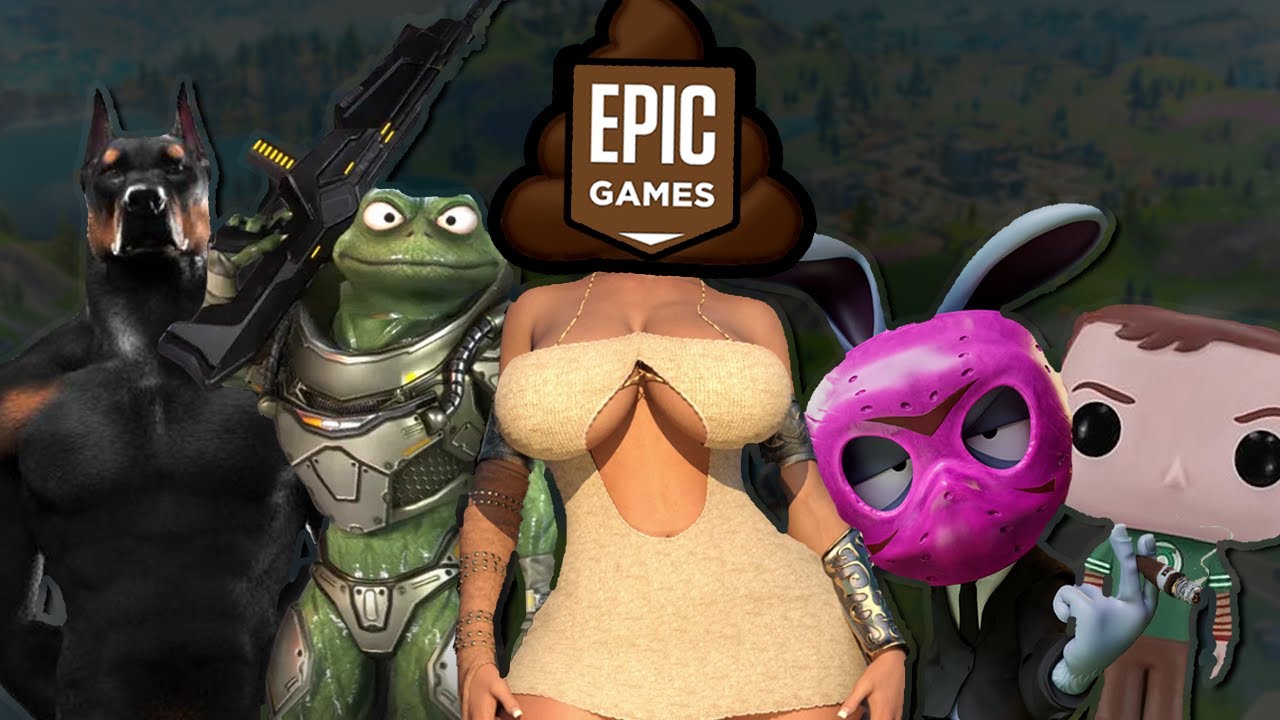- cross-posted to:
- games@hexbear.net
- cross-posted to:
- games@hexbear.net
Surprised Pikachu face
Yall actually buy games on Epic and don’t just log in once a week for your weekly freebie?
There’s other places on the internet to get free games, and they don’t require installing a client.
Got hundreds of games on it.
Paid for 4 of them. And they were all on special offers.
At least the Beanie Baby people still had little stuffed animals to console themselves with.
I made a account ages ago and got two or three free games but I can’t find it anymore and honestly don’t really give a shit ether, I got more than enough unplayed games on Steam!
Yeah but I’ve gotten some absolutely stellar games for free. The ones that cone to mind are Satisfactory, Subnautica, and Prey. Well worth it
Satisfactory was never given away for free.
Huh. I don’t remember buying it. Great game though.
I had Ark which I want to play for over five years by now but considering I never thought about it again till now it’s probably not the biggest loss!
Dodged a bullet.
deleted by creator
Death Stranding and the Bioshock trilogy. Still haven’t played them though lol
I did like Death Stranding. Which surprised me because it feels like a bonkers indie game about a post-apocalyptic Deliveroo driver, but inexplicably given a $100m AAA budget. He still can’t write dialogue for shit, all the celebrity cameos are hilariously out of place, almost nothing makes any sense until the last 20 minutes, and there’s grind in awkward places.
And in spite of everything, I can’t help but admire the unapologetic nature of the concept. It’s kind of like Red Dead Redemption 2, in that it goes against everything gamers normally want, to the point you can almost hear the boardroom full of middlemen getting frustrated that there’s not enough shooting, or wondering where there the multiplayer funbucks are.
I’m just grabbing the free games on EGS anyway.
So many free games I never play.
I’m quite happy I never bit the bullet with them. Makes watching from the sidelines more entertaining.
Bit the bullet as in… downloading a free app and clicking a button every week to get free games? Good for you?
Don’t think you even have to download the
data harvesterapp until you want to install a game, pretty sure you can claim the free games through a web browser.Yup, that’s what I do. It takes maybe a minute on my phone, so it’s really not a real time investment. I’ve never installed EGS, I just claim stuff and go on with my day.
Edit: I’m also on Linux, so the one time I wanted to try a game from EGS, I used Heroic launcher. So if you’re on Linux, you don’t even need to download EGS to play games.
Yup, I’ve got my reminder set and claim then from my phone every week
Epic Store is basically spyware. No moreso than EA or most publishers, but still, the fewer you have installed the better
Lol no it isn’t
Yes it is. Have a read through the terms and conditions.
deleted by creator
This channel is a gem, a great look into the “bright” future crypto games hold for us
I think the problem is the focus on making crypto games, instead of using cryptocurrencies as a tool to solve a real problem.
For example, it could be interesting to make a cryptocurrency that doesn’t connect to any exchanges for trading in-game items. Cryptocurrencies can be tracked through every transaction, so user accounts involved in transactions involving real money could be penalized, so it could be a tool for preventing abuse of the currency. I’m not sure if it would actually work, but it could be an interesting experiment to allow a currency to exist across games but not turn into a monster.
But when cryptocurrency is the gimmick, player experience will take a backseat and it’ll suck.
What would this solve that a simple database couldn’t? If the currency can only be used to trade for in game items, what practical value does it gain from being a crypto currency as opposed to just WOW gold or whatever? It’s just some points that the game developer tallies up in a ledger somewhere, right?
A cryptocurrency that doesn’t connect to an exchange is just a ledger with extra steps.
It’d only be useful if the game itself was decentralized too. Otherwise any problems will just find the weak point. So in 20 years when the company goes under, the whole thing would need to keep working without them.
The things you own could outlast the server. Let’s say WOW shuts down, but they allow private servers, you’d essentially need to start from scratch for each server you join unless they somehow got a dump of the official databases (not happening). Your stuff could live as long as enough peers exist to verify it.
All the more reason for companies not to do it. WOW has no interest in supporting your use of a private server.
I’m not saying WOW would, just that a game like WOW could be designed that supports private servers. So maybe they intend to make money from the initial sale and want players to keep things they earn or trade for in game.
I think it would be a novel approach to an MP game.
A database is centralized, can be shut down and is not public.
But you’re buying and selling in game items in the scenario the previous user described. So it’s already centralized.
Like, say you’re using this to trade Diablo loot. If Blizzard shuts down the servers, it doesn’t matter if you still have a decentralized system where all your loot ownership is recorded, because there are no servers to use it on. So what have you gained?
Sounds like crypto once again a solution looking for a problem
Actually the Ethereum blockchain was created from this very motivation https://www.polygon.com/22709126/ethereum-creator-world-of-warcraft-nerf-nft-vitalik-buterin
The whole point is that the certification of ownership will even surpass the death of the game. It still work in 3rd part apps and still can be traded.
It’s simillar to a banned magic card. You can’t use it in tournament play, but you can sell it on the secondary market.
Also someone can implement and host an alternative game client to the item ownership data.
Obviously you should only play decentralized open source games to prevent the scenario of shutdown.
OK, so follow up question; say I’m Blizzard. What incentive do I have to implement this?
Databases can be public.
You mean like things the YouTube API, where the centralized owner can decide to not show downvote data anymore?
The whole issue is that crypto is supposed to be an incentive for contributing compute resources to a Blockchain. The value of those tokens are inherently linked to the value of the applications the Blockchain supports. The downfall of every crypto system has been the inversion of this fundamental relationship - you can’t bootstrap a Blockchain app just by pumping the tokens, because people holding tokens for speculation don’t contribute resources to the mesh.
Blockchain needs a killer app first. And crypto needs serious anti-speculation measures which incentives liquidity of the tokens.
Basically, the crypto-blockchain ownership for gaming goods only becomes viable when you make the one big step:
Governments force the software vendors to support fair-use rules that give us the same control over digital goods as we have with physical products.
Right now, software companies get to write whatever copyright rules they like. They don’t have to let you resell the software, or transfer it, or whatever. They don’t even have to let you keep it beyond warranty laws in many jurisdictions. As soon as the warranty is over, any cloud-based purchases you still have access to are essentially just goodwill from the vendor - they can take the servers down or boot you out and you have very little recourse.
So while blockchains might be a good solution for giving digital goods the same advantages as physical goods - like if the ownership of my Overwatch skins, or of various indie-games were on the Blockchain, I could sell them used freely on used-product marketplaces just like I can the paperback books on my bookshelf. Of course, this would create new problems: with a robust used-products market, how does the vendor make money if people aren’t buying so much stuff from them? Well, making new stuff still gives them new stuff to sell - they’re the only ones who can mint new software licenses or digital good ownership tokens. They could also charge for access to servers, but then there’s questions of whether that, too, is letting them write their own copyright since nobody else has access to the server hosting software.
If a major market country like the US or the EU laid down the law and said:
-
All digital-purchased goods must be transferrable, and
-
All digital-purchased software licenses must be transferrable (although only patch guarantees are up to the original warranty)
Then I could see many software vendors saying “I don’t want to deal with supporting the used-stuff market I can see how much of a headache that was for Valve, I’ll just offload managing your licenses to a Blockchain”.
Of course, more likely everybody would just switch to a subscription model like cloud service companies.
I mean, if you made “you must publish your application-server software for free, as long as it checks with a respected 3rd-party like a blockchain for client validation” a rule, then what would happen to eg. Office 365? Would Microsoft be expected to give away free Office 365 server-software? Would each monthly or yearly subscription purchase also be a blockchain token? So like in addition buying a blockchain token of “1 stout shako” you could buy a blockchain token of “access to Office 365 from March 1 2024 12am UTC to March 1 2025 12am UTC”. Then your subscription has all the same benefits of a physical good as well. Idunno.
Also there’s always the question of whether blockchains can scale to this size without falling over. If it’s too hard, then the gas costs of minting micropurchases are unsustainable or transaction times are too slow. In the reverse case, if it’s too easy (ie ownership transfers at no cost and instantly), you could have a second-by-second lending library where you rent access to the Ghastly Gibus for the exact length of your play session and one Ghastly Gibus is being used by dozens of people per week and the benefits of owning anything goes through the floor and the vendors have to charge far more than before to own the software licenses and all the money goes into these hypothetical arbitrage rental blockchain services.
I’m a little more interested in this conversation now that Ethereum has proven out Proof of Stake, and so they’re no longer burning down the world to power this stuff. But still, fundamentally Blockchain is a solution looking for a problem.
You got to the root of the problem, ownership vs licenses, very eloquently.
However, I don’t think it needs to be enforced for every game or software service. Yeah, it would be nice to transfer my license when I no longer need it, but I’m totally fine with software vendors not allowing transfers, or only allowing transfers through them (e.g. like Steam marketplace).
However, I do think digital licenses should be unrevokable without full compensation of the original, inflation-adjusted purchase price. And a license is not just to the client, but the complete solution, so the vendor would be required to either keep the server in operation or make the server available for the end user to operate themselves, and if they release the server component, they are released from their obligations to the licensee.
So if I own a license to a game with an online multiplayer component, and the company wants to discontinue the servers, I get complete access to the server in a form that I could reasonably run myself to maintain the complete solution, complete with my user data. I could then legally host it for any other licensed user to access (though they may need to provide their user data to me to load onto my instance).
At no point would blockchain be required, but it would be an option if vendors wanted to outsource license verification, otherwise they would need to keep their license servers running indefinitely.
Subscription services are a bit more tricky since you don’t have a long term licence. So I think for those, the vendor would only be obligated to provide you your data in a format that can be used with a similar product. So if Office 365 shuts down, they could provide your Word docs in a format a competitor (say, LibreOffice) understands, likewise for other parts of the stack. If no direct analogue is available, they have to make a reasonable effort or face legal damages for breach of contract.
That’s about as far as I’d want to take it.
blockchain is a solution looking for a problem
I disagree. The problem is clearly stated: we don’t trust centralized banks to manage currencies. Central banks have proven willing to steal from the average person by maintaining positive inflation (essentially a convoluted tax on savings). Currencies can also be replaced, which means money is a revokable license to value, not value itself.
But it creates other problems as well. Since it’s a store of value uncorrelated with fiat currencies, there’s going to be speculation between the two. If that speculation outpaces mass adoption for transactions and as a store of value, it’ll scare away the mass market and it’ll stay dominated by speculation.
But that doesn’t mean there’s no valid use case, it just means we need to be more careful about the use cases we choose for it. In the case of games, the vendor would be the only one to produce new coins or whatever, so that eliminates mining entirely, and if the vendor has a fixed price for goods, speculation can be kept under control. Coin minting doesn’t have to be decentralized to have a decentralized blockchain, a blockchain is merely a public ledger of transactions that can be cryptographically verified by anyone. When the game servers go down, the vendor would only need to release the server code and anyone could host it using the public ledger, so there would be no need to import user data.
That’s one possible use case, but I’m sure there are plenty others. It’s just that speculation is a much more lucrative application since you just need to convince suckers to buy into your coin. But just because it’s easy to turn into a scam doesn’t mean the tech has no valid use.
-
Perfectly stated
That wojak funko pop they show at 1:18 is hillarious.
Wonder if someone actually made it?
I searched wojak funko pop but i get nothing in return…
Must be photoshoped.

I wasn’t going to watch the video, because I thought the title of the thread was funny enough. I’m glad I did. Ugh.
Here is an alternative Piped link(s):
https://piped.video/watch?v=iJdCbSohWdI
Piped is a privacy-respecting open-source alternative frontend to YouTube.
I’m open-source; check me out at GitHub.
Wow.
No way.
(just kidding)
It was going to end up in a landfill anyway. Epic just thought they could milk crypto-bros before they went.
Turns out that bubble is well and truly popped. Nvidia is worth about the same as all cryptocoins added together.
deleted by creator














